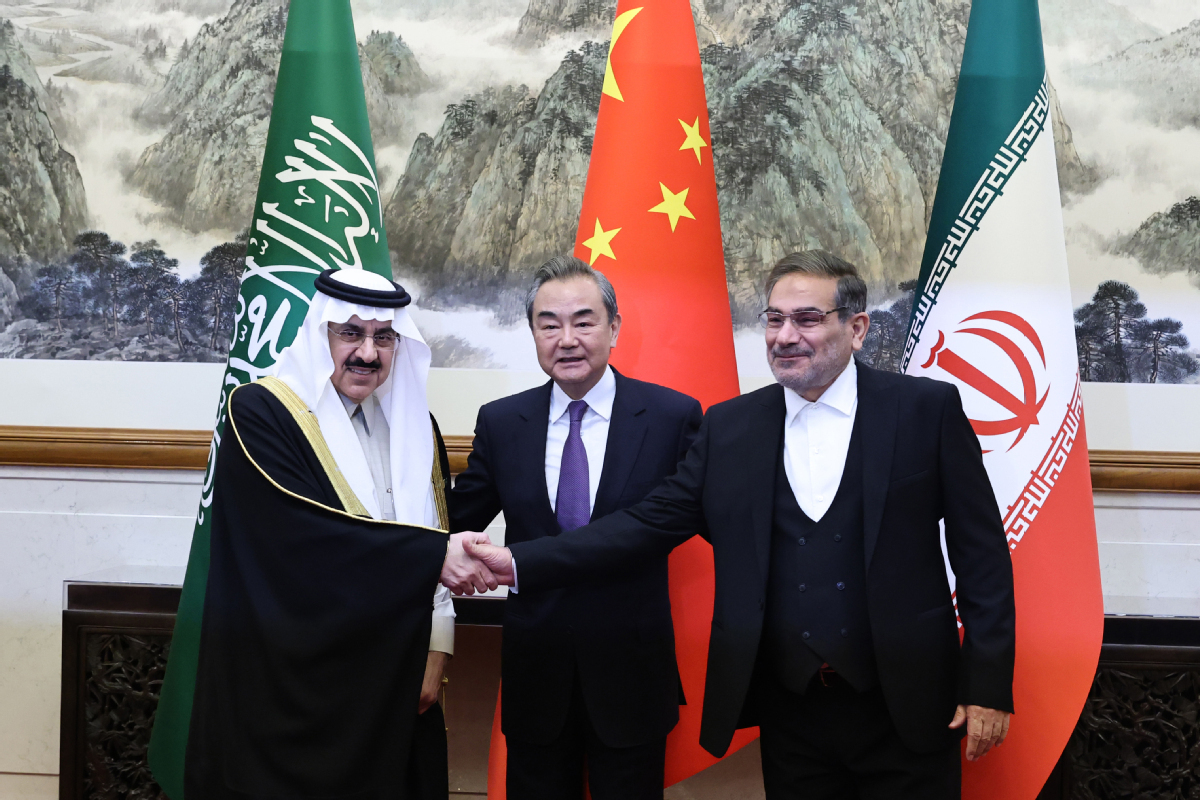Wang Yi (center), a member of the Political Bureau of the Communist Party of China Central Committee and director of the Office of the Central Foreign Affairs Commission, with representatives from Saudi Arabia and Iran in Beijing on Friday. [Photo by Wang Jing / China Daily] Saudi Arabia, Iran, and China issued a joint statement in Beijing on March 10, announcing that the two Middle East countries will resume diplomatic relations and activate important bilateral agreements that had been put on hold for seven years. The rare, high-profile diplomatic development, made possible by the mediation of China, widens Beijing's global influence, especially in terms of diplomatic mediation. That it will help bring stability to the Middle East and promote the normalization of relations between other countries in the region is a given. China's achievement is all the more comforting because the world didn't see it as a major player in the Middle East, and considered the United States and Russia to be the most influential political players. Major peace initiatives in the region have often been facilitated by the US, including the peace agreement between Egypt and Israel brokered by former president Jimmy Carter in Camp David in 1978, and the Oslo Accords signed between Palestine and Israel in 1993 and overseen by former president Bill Clinton. The China-mediated talks between Saudi Arabia and Iran were held in secret. So the diplomatic community, the media and commentators were surprised by the tripartite statement issued during the two sessions, but they had to admit that China had successfully brought the two major rivals in the Middle East together. It took five days of closed-door talks for China's senior diplomat, Wang Yi, and his Saudi Arabian and Iranian counterparts, to achieve a positive result. The joint statement highlights the key role played by China and the strong desire of Saudi Arabia and Iran to repair their relationship. The statement emphasizes that this meeting was in response to President Xi Jinping's initiative to help Saudi Arabia and Iran develop good-neighborly and friendly relations, and was held in accordance with the consensus reached between President Xi and the leaders of the two countries. Equally important, Riyadh and Teheran have agreed to "activate" the security cooperation agreement of 2001 and the comprehensive bilateral cooperation agreement of 1998 which covers areas such as the economy, trade, investment, technology, science, culture and sports. The positive effects of this development could also help normalize the fragile relationship between Saudi Arabia and Qatar. Qatar, which distanced itself from Saudi Arabia and kept ties with Iran, was sanctioned and isolated by the small Saudi Arabia-led alliance. So if Saudi Arabia-Qatar ties are fully restored, it will help unify the Gulf countries and promote the integration of the Gulf Cooperation Council, which has gone through many ups and downs. Similarly, the development may create opportunities for Syria, which along with Iran is part of the "Shiite Crescent", to return to the Arab world after being isolated by the Arab League for 12 years. It might also prompt the Houthi militia in Yemen, said to be under Iran's influence, to change its attitude and strategy, and agree to hold talks with Saudi Arabia to end the civil war in Yemen. Saudi Arabia has long accused the Houthi militia of being Iran's proxy and posing a strategic threat to it, while Teheran has criticized Riyadh for its brutal interference in Yemen's internal affairs. Furthermore, with the restoration of Saudi Arabia-Iran ties, two radical militias opposing Israel — the Lebanese Hezbollah and the Palestinian Hamas which followed Iran's will — may be taken off the "terrorist organization" blacklist by Saudi Arabia and Egypt, among others. After the joint statement was released, Wang said that there are other hot spot issues that other major countries should try to resolve, suggesting that the Ukraine crisis is not the only one that deserves the international community's attention. He stressed the importance of dialogue based on equality and mutual respect to find solutions that are acceptable to both sides. As the mediator of the secret meeting between Riyadh and Teheran, Wang's goal is to promote peace and stability in the Middle East. In March 2021, Wang, then state councilor and foreign minister, visited six Middle East countries, including Saudi Arabia, and promoted the 25-year strategic cooperation framework agreement between China and Iran. In January 2022, he organized a "Middle East Week" in Wuxi, Jiangsu province, where he met with the foreign ministers of six Middle East countries, including those of Saudi Arabia and Iran. These activities not only showed China attaches great importance to Middle East affairs but also increased the regional countries' trust in China, and helped ease tensions between Saudi Arabia and Iran. It was Xi's visit to Saudi Arabia at the end of 2022, and China-Arab summit, as well as China-Gulf Cooperation summit, that pushed China-Arab ties toward institutionalization. That in turn spurred Iran to strengthen cooperation with China and prompted Iranian President Ebrahim Raisi to visit China in February 2023. These two top-level diplomatic visits played a key role in improving Saudi Arabia-Iran ties. Not to forget that regional neighbors showed a strong desire for Riyadh and Teheran's rapprochement. The international community has generally welcomed the rapprochement between the two major Middle East powers and the two largest energy producing and exporting countries, because it is beneficial for the stability of the Middle East and the global energy market. The US, too, has welcomed the development, especially because it doesn't want Israel to use military force against Iran and drag the US back into the Middle East quagmire, because the strategic focus of the US has shifted to Eurasia to rival with Russia and China.
Riyadh-Teheran detente proves China's peace diplomacy
Editor:谭婕倪
Source:chinadaily
Updated:2023-03-15 10:43:31
Source:chinadaily
Updated:2023-03-15 10:43:31
Special
Contact
Welcome to English Channel! Any suggestion, welcome.Tel:0731-82965627
lisl@rednet.cn
zhouqian@rednet.cn











